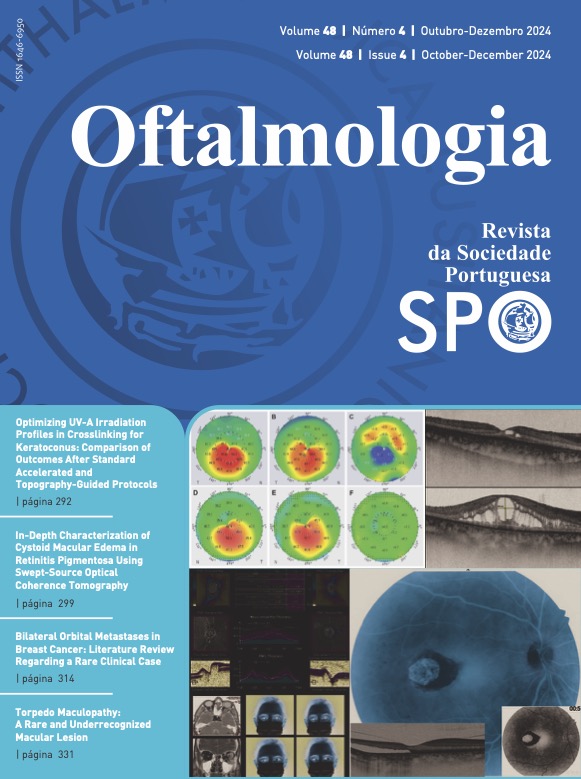Genetic Risk for Extramacular Drusen and Age-Related Macular Degeneration in the Coimbra Eye Study
DOI:
https://doi.org/10.48560/rspo.33240Keywords:
Genetic Association Studies, Genetic Risk Score, Macular Degeneration, Retinal DrusenAbstract
INTRODUCTION: The genetic risk for age-related macular degeneration (AMD) was previously evaluated in the AMD incidence study (Coimbra Eye Study, NCT02748824) including a genetic risk score (GRS) analysis. In AMD most genotype-phenotype associations rely on the phenotypic analysis of the macular area, with few analyzing extramacular drusen (EMD). Genetic associations between these peripheral changes and genotypes known to be associated with AMD were explored by few groups and with conflicting results. Our purpose was to evaluate the relationship between GRS for AMD and the presence of EMD in the participants from AMD incidence study with and without AMD, and to explore whether the EMD phenotype could represent another expression of genetic susceptibility.METHODS: Multimodal imaging with color fundus photography, optical coherence tomography, autofluorescence and near-infrared imaging was used to assess the presence and staging of AMD and EMD. To test for differences in the GRS between 4 groups: AMD only, AMD+EMD, EMD only and controls, an adjusted clustered Wilcoxon rank sum test was used. Associations of GRS with EMD and AMD were assessed using adjusted logistic regression models.
RESULTS: A total of 1846 eyes (939 subjects) were included: 570 eyes had EMD only, 252 eyes had EMD+AMD, 122 eyes had AMD only, and 902 eyes were controls. For genetic analysis, the phenotype-genotype sample comprised 1612 eyes (829 subjects) – 346 eyes with AMD and 1266 eyes without AMD. The GRS from control eyes was inferior compared to AMD eyes with and without EMD (p=1.4e-07; p=0.0001), and the GRS from eyes with only EMD was also inferior compared with AMD eyes with and without EMD (p=2.5e-05, p=0.0019). There was a strong association between EMD and AMD (OR=3.118,95% CI 2.239-4.342, p<0.001). GRS was associated with AMD (OR=1.444,95% CI 1.248-1.670, p<0.001), but no association with EMD was found when adjusting for the coexistence of AMD (OR=1.092,95% CI 0.964-1.235, p=0.16).
CONCLUSION: Our results highlight a strong relationship between AMD and EMD. However, GRS, calculated based on risk variants for AMD, was surprisingly not associated with EMD per se in our population. Further studies are required to understand the clinical relevance of genetic risk factors in EMD, with or without AMD.
Downloads
References
Farinha C, Cachulo ML, Alves D, et al. Incidence of age-related macular degeneration in the central region of Portugal: the Coimbra Eye Study – report 5. Invest Ophthalmol Vis Sci. 2019;60(9):58-58.
Yoon CK, Kim YA, Park UC, et al. Vitreous Fatty Amides and Acyl Carnitines Are Altered in Intermediate Age-Related Macular Degeneration. Invest Ophthalmol Vis Sci. 2023;64(3):28.
Colijn JM, Meester-Smoor M, Verzijden T, et al. Genetic Risk, Lifestyle, and Age-Related Macular Degeneration in Europe: The EYE-RISK Consortium. Ophthalmology. 2021;128(7):1039-1049.
Farinha C, Barreto P, Coimbra R, et al. Common and rare genetic risk variants in age-related macular degeneration and genetic risk score in the Coimbra eye study. Acta Ophthalmol. 2023;101(2):185-199.
Domalpally A, Xing B, Pak JW, et al. Extramacular Drusen and Progression of Age-Related Macular Degeneration: Age Related Eye Disease Study 2 Report 30. Ophthalmol Retina. 2023;7(2):111-117.
Altay L, Subiras X, Lorés de Motta L, et al. Genetic and environmental risk factors for extramacular drusen. Mol Vis. 2020;26:661-669.
Pivovar A, Oellers P. Peripheral Manifestations in Age Related Macular Degeneration: A Review of Imaging and Findings. J Clin Med Res. 2021;10(17). doi:10.3390/jcm10173993
Seddon JM, Reynolds R, Rosner B. Peripheral retinal drusen and reticular pigment: association with CFHY402H and CFHrs1410996 genotypes in family and twin studies. Invest Ophthalmol Vis Sci. 2009;50(2):586-591.
Geerlings MJ, de Jong EK, den Hollander AI. The complement system in age-related macular degeneration: A review of rare genetic variants and implications for personalized treatment. Mol Immunol. 2017;84:65-76.
Raimundo M, Mira F, Cachulo M da L, et al. Adherence to a Mediterranean diet, lifestyle and age-related macular degeneration: the Coimbra Eye Study - report 3. Acta Ophthalmol. 2018;96(8):e926-e932.
de Breuk A, Acar IE, Kersten E, et al. Development of a Genotype Assay for Age-Related Macular Degeneration: The EYE-RISK Consortium. Ophthalmology. 2021;128(11):1604-1617.
Herold JM, Zimmermann ME, Gorski M, et al. Genetic Risk Score Analysis Supports a Joint View of Two Classification Systems for Age-Related Macular Degeneration. Invest Ophthalmol Vis Sci. 2023;64(12):31.
Cachulo M da L, Laíns I, Lobo C, et al. Age-related macular degeneration in Portugal: prevalence and risk factors in a coastal and an inland town. The Coimbra Eye Study - Report 2. Acta Ophthalmol. 2016;94(6):e442-53.
Farinha C, Cachulo ML, Coimbra R, et al. Age-Related Macular Degeneration Staging by Color Fundus Photography vs. Multimodal Imaging—Epidemiological Implications (The Coimbra Eye Study—Report 6). J Clin Med Res. 2020;9(5):1329.
Tsikata E, Laíns I, Gil J, et al. Automated Brightness and Contrast Adjustment of Color Fundus Photographs for the Grading of Age-Related Macular Degeneration. Transl Vis Sci Technol. 2017;6(2):3.
Klaver CC, Assink JJ, van Leeuwen R, et al. Incidence and progression rates of age-related maculopathy: the Rotterdam Study. Invest Ophthalmol Vis Sci. 2001;42(10):2237-2241.
van Leeuwen R, Klaver CCW, Vingerling JR, Hofman A, de Jong PTVM. The risk and natural course of age-related maculopathy: follow-up at 6 1/2 years in the Rotterdam study. Arch Ophthalmol. 2003;121(4):519-526.
Fritsche LG, Igl W, Bailey JNC, et al. A large genome-wide association study of age-related macular degeneration highlights contributions of rare and common variants. Nat Genet. 2016;48(2):134-143.
Ersoy L, Schick T, de Graft D, et al. Extramacular drusen are highly associated with age-related macular degeneration, but not with CFH and ARMS2 genotypes. Br J Ophthalmol. 2016;100(8):1047-1051.
Corbelli E, Borrelli E, Parravano M, et al. Multimodal imaging characterization of peripheral drusen. Graefes Arch Clin Exp Ophthalmol. 2020;258(3):543-549.
Shuler RK Jr, Schmidt S, Gallins P, et al. Peripheral reticular pigmentary change is associated with complement factor H polymorphism (Y402H) in age-related macular degeneration. Ophthalmology. 2008;115(3):520-524.
Lengyel I, Csutak A, Florea D, et al. A Population-Based Ultra-Widefield Digital Image Grading Study for Age-Related Macular Degeneration-Like Lesions at the Peripheral Retina. Ophthalmology. 2015;122(7):1340-1347.
Forshaw TRJ, Minör ÅS, Subhi Y, Sørensen TL. Peripheral Retinal Lesions in Eyes with Age-Related Macular Degeneration Using Ultra-Widefield Imaging: A Systematic Review with Meta-analyses. Ophthalmol Retina. 2019;3(9):734-743.
Nagiel A, Lalane RA, Sadda SR, Schwartz SD. ULTRA-WIDEFIELD FUNDUS IMAGING: A Review of Clinical Applications and Future Trends. Retina. 2016;36(4):660-678.
Munch IC, Ek J, Kessel L, et al. Small, hard macular drusen and peripheral drusen: associations with AMD genotypes in the Inter99 Eye Study. Invest Ophthalmol Vis Sci. 2010;51(5):2317-2321.
Belmouhand M, Rothenbuehler SP, Hjelmborg JB, et al. Heritability of retinal drusen in the Copenhagen Twin Cohort Eye Study. Acta Ophthalmol. 2022;100(8):e1561-e1568.
Mantel I, Ambresin A, Moetteli L, et al. Complement factor B polymorphism and the phenotype of early age-related macular degeneration. Ophthalmic Genet. 2014;35(1):12-17.
Heesterbeek TJ, Lorés-Motta L, Hoyng CB, Lechanteur YTE, den Hollander AI. Risk factors for progression of age-related macular degeneration. Ophthalmic Physiol Opt. 2020;40(2):140-170.
Ko SH, Jung Y. Energy Metabolism Changes and Dysregulated Lipid Metabolism in Postmenopausal Women. Nutrients. 2021;13(12). doi:10.3390/nu13124556
Fraser-Bell S, Donofrio J, Wu J, et al. Sociodemographic factors and age-related macular degeneration in Latinos: the Los Angeles Latino Eye Study. Am J Ophthalmol. 2005;139(1):30-38.
Downloads
Published
How to Cite
Issue
Section
License
Copyright (c) 2024 Revista Sociedade Portuguesa de Oftalmologia

This work is licensed under a Creative Commons Attribution-NonCommercial 4.0 International License.
Do not forget to download the Authorship responsibility statement/Authorization for Publication and Conflict of Interest.
The article can only be submitted with these two documents.
To obtain the Authorship responsibility statement/Authorization for Publication file, click here.
To obtain the Conflict of Interest file (ICMJE template), click here





